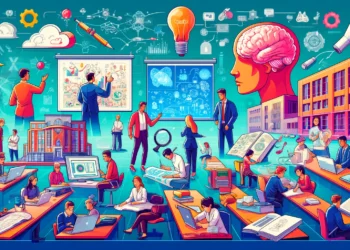A rare kind of aphasia, abbreviated PPA, leaves people at loss for words. Patients blabber and stutter, seemingly unable to communicate. Often times families think their diseased relatives and loved ones have Alzheimer’s. Because primary progressive aphasia is so rare and unknown, even doctors often misdiagnose the disease. Upon closer inspection, though, the PPA patient clearly is able to understand questions and reason. It’s just they simply can’t verbally use words. At a recent meeting of the American Association for the Advancement of Science, PPA has been put in the center of discussion to raise awareness but also share some of the most promising therapies.
A disease that gags people
In front of an audience at the meeting stood Robert Voogt of Virginia Beach, Virginia, who was diagnosed with PPA some ten years ago. Voogt owns a brain-injury rehabilitation center, and his experience luckily got him the right diagnosis since he knew which doctors to call. Apart from being unable to speak, Voogt leads a normal life. He travel internationally, still runs his business and can reason. To communicate, he uses a special device which he uses to input text and have it played out loud through an embedded speaker. “I have trouble speaking, but I can understand you,” Voogt told the audience through his device.
Voogt’s disorder wasn’t identified until the late 1980s, and is still poorly understood and known. Families may not even seek care because they assume a loved one’s increasingly garbled attempts to communicate are because of age-related dementia, said Dr. Argye Elizabeth Hillis of Johns Hopkins University. Unlike Alzheimer’s, P.P.A. does not affect memory, at least not initially. It also tends to occur at younger ages, often in the late 50s, and affects twice as many men as women.
Speaking is a highly complex cognitive ability which involves 100 muscles between the lungs and lips, which all synchronize in harmony to produce 14 distinct sounds per second. What happens in patients with PPA is the brain region responsible for controlling language becomes degenerate resulting in communication difficulties. The persona can still perfectly understand when he’s being talked to, though its true as the disease progresses cognitive decline can occur.
As with other speech therapies, aphasia patients undergo a process in which they match pictures to the correct word. This helps activate the wiring between the neurons responsible for speech. Sign language doesn’t work because it, too, depends on the region of the brain that is diseased. Hillis and colleagues, however, are experimenting with a novel kind of therapy. It consists of a brain stimulation that sends electrical signals through the skull in conjunction with typical speech therapies.
A trial was made on 19 patients. Most people did better retrieving the right words for about two months after receiving the electrical stimulation than when they received sham zaps with their regular therapy. They were better at naming objects which they hadn’t practiced before and brain scans showed increased activity in key areas responsible for speech.
Like in the case of Alzheimer’s, there is no cure for P.P.A. Therapies such as those designed by Hillis and others will hopefully lessen the burden on families and help patients lead closer to normal lives.







